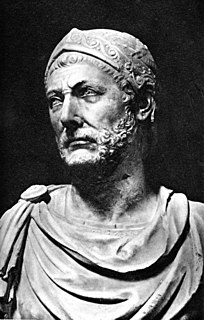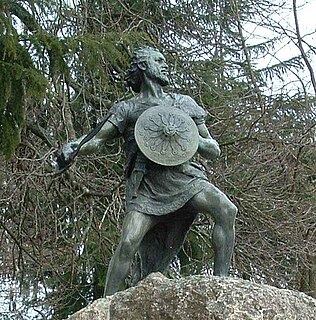Related Research Articles

Hannibal Barca was a Carthaginian general and statesman who commanded Carthage's main forces against the Roman Republic during the Second Punic War. He is widely considered one of the greatest military commanders in world history. His father, Hamilcar Barca, was a leading Carthaginian commander during the First Punic War. His younger brothers were Mago and Hasdrubal, and he was brother-in-law to Hasdrubal the Fair, who also commanded Carthaginian armies.

The Battle of Cannae was a key engagement of the Second Punic War between the Roman Republic and Carthage, fought on 2 August 216 BC near the ancient village of Cannae in Apulia, southeast Italy. The Carthaginians and their allies, led by Hannibal, surrounded and practically annihilated a larger Roman and Italian army under the consuls Lucius Aemilius Paullus and Gaius Terentius Varro. It is regarded as one of the greatest tactical feats in military history and one of the worst defeats in Roman history.

Lucius Aemilius Paullus was a Roman consul twice, in 219 and 216 BC.

Viriathus was the most important leader of the Lusitanian people that resisted Roman expansion into the regions of western Hispania or western Iberia, where the Roman province of Lusitania would be finally established after the conquest.

The Lusitanians were an Indo-European people living in the west of the Iberian Peninsula prior to its conquest by the Roman Republic and the subsequent incorporation of the territory into the Roman province of Lusitania.

Silius Italicus, in full Tiberius Catius Asconius Silius Italicus, was a Roman consul, orator, and epic poet of the Silver Age of Latin literature. His only surviving work is the 17-book Punica, an epic poem about the Second Punic War and the longest surviving poem in Latin at over 12,000 lines.

The Vettones were a pre-Roman people of the Iberian Peninsula of possibly Celtic ethnicity.

This is a historical timeline of Portugal.

The Gallaeci, Callaeci or Callaici were a large Celtic tribal federation who inhabited Gallaecia, the north-western corner of Iberia, a region roughly corresponding to what is now northern Portugal, Galicia, western Asturias and western Castile and León in Spain, before and during the Roman period. They spoke a Q-Celtic language related to Northeastern Hispano-Celtic, usually called Gallaic, Gallaecian, or Northwestern Hispano-Celtic. The region was annexed by the Romans in the time of Caesar Augustus during the Cantabrian Wars, a war which initiated the assimilation of the Gallaeci into Latin culture.

The Siege of Saguntum was a battle which took place in 219 BC between the Carthaginians and the Saguntines at the town of Saguntum, near the modern town of Sagunto in the province of Valencia, Spain. The battle is mainly remembered today because it triggered one of the most important wars of antiquity, the Second Punic War.
Marcus Atilius Regulus, a son of Marcus Atilius Regulus, the consul captured during the First Punic War, and a grandson of Marcus Atilius Regulus, was a Roman consul for the year 227 BC, together with Publius Valerius Flaccus, and was a consul suffectus in 217 BC, replacing Gaius Flaminius, who was killed in battle at Lake Trasimene.
Gnaeus Servilius Geminus was a Roman consul, serving as both general and admiral of Roman forces, during the Second Punic War.

The Punica is a Latin epic poem in seventeen books in dactylic hexameter written by Silius Italicus comprising some twelve thousand lines. It is the longest surviving Latin poem from antiquity. Its theme is the Second Punic War and the conflict between the two great generals Hannibal and Scipio Africanus. The poem was re-discovered in either 1416 or 1417 by the Italian humanist and scholar Poggio Bracciolini.
This section of the timeline of Hispania concerns Spanish and Portuguese history events from the Carthaginian conquests to before the barbarian invasions.
Punicus was a chieftain of the Lusitanians, a proto-Celtic tribe from western Hispania. He became their first military leader during the Lusitanian War, and also led their first major victories against Rome.
Caesarus was a chieftain of the Lusitanians, a proto-Celtic tribe from western Hispania. He followed and later replaced Punicus as their major military leader during the Lusitanian War.

Warfare in ancient Iberian peninsula occupied an important place in historical chronicles, first during the Carthaginian invasion of Hispania, including the Punic Wars, and later during the Roman conquest of the peninsula. The densely bellicose character of the Pre-Roman peoples who inhabited Hispania was repeatedly shown in their conflicts against Rome, Carthage and each other.
Larus was a leader of Cantabrian mercenaries in the Carthaginian army during the Second Punic War, according to Silius Italicus's poem Punica.

Mercenary life is recorded as a custom of Iron Age Spain, particularly in the central area of the Iberian peninsula. Departing from the native tribe and applying to serve in others was a way for economically disadvantaged youth to escape poverty and find an opportunity to use their fighting skills. Starting from 5th century BC, mercenary life would become a true social phenom in Hispania, with great numbers of fighters from distant lands coming to join the armies of Carthage, Rome, Sicily and even Greece, as well as other Spanish peoples.
Asbyte was a Libyan princess in the Carthaginian army before the Second Punic War, according to Silius Italicus's poem Punica.
References
- 1 2 Silius Italicus, Punica , 3, 354
- 1 2 3 Silius Italicus, Punica, 5, 219-233
- 1 2 Luciano Pérez Vilatela (2000). Lusitania: historia y etnología (in Spanish). Real Academia de Historia. ISBN 978-84-895126-8-9.
- ↑ Martín Sarmiento (2008). Obra de 660 pliegos, Volumen 4 (in Spanish). CSIC Press. ISBN 978-84-965303-8-6.
- ↑ Luís de Camões, Os Lusíadas , Canto III